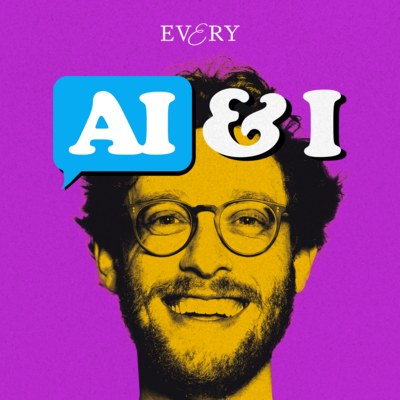
The Secret to Building Sticky AI Products
Granola cofounder and CEO Chris Pedregal on how to make winning product decisions
December 12, 2024
TL;DR: Today we’re releasing a new episode of our podcast AI & I. I go in depth with Chris Pedregal, the cofounder and CEO of AI note-taking app Granola. We get into Chris’s philosophy around building useful consumer AI products and how you can hone your skills to do the same. Watch on X or YouTube, or listen on Spotify or Apple Podcasts. Also ICYMI: Yesterday, we launched a new experiment, TLDR, a synthetic show of 3-5 minute AI-generated podcast episodes to catch you up on meetings you missed at your company. We used it to generate podcasts from our internal meetings at Every, and you can check them out on YouTube or Spotify. If you’re interested in bringing TLDR to your company, apply now. We’re looking to partner with 10 companies in Q1 2025.
Chris Pedregal knows how to build AI products that people love.
Chris is the cofounder and CEO of Granola, an AI-powered notepad for meetings. We use it for many of our meetings at Every—the app listens in on the conversation, transcribes it in the background, and when the meeting ends, creates automated notes and a shareable transcript for anyone who missed it. If you take notes during the meeting, Granola polishes them to be more organized and complete.
Granola is one of my favorite consumer AI products because it’s equal parts delightful and useful. It’s not a bland chat interface. It’s not an over-the-top demo that you wouldn’t use more than once. Granola is a product with “soul,” imbued with the team’s vision for how AI can work alongside you to turn discursive conversations into clear insights. And I’m not the only one who thinks so—since Granola’s launch in May 2024, its user base has grown by 5x, with around 5,000 weekly active users, and half the people who try the app still use it 10 weeks later for an average of six meetings a week. The company also recently raised a $20 million Series A.
FetchFoxAI
Scrape just about anything with AI
What used to take hours with traditional scraping can now be done in seconds with FetchFox—the AI-powered web scraper that takes the raw text of a website, and uses AI to extract data you’re looking for.
Describe your desired data in plain English and watch FetchFox quickly get to work. It can help with things like building a list of leads, assembling research data, or scoping out a market segment.
Fetchfox is available as both a web app and Chrome extension. No coding required. 🙅♂️ Ready to try it for yourself?
Granola has the marks of being built by a thoughtful, intentional team, which is why I was excited to have Chris on the show. We spent an hour talking about Chris’s product development philosophy, the role of intuition in making products with “soul” and how he balances this with user feedback, how you can become a better product thinker, and the kinds of consumer AI startups Chris thinks will succeed. Here is a link to the episode transcript.
This is a must-watch for anyone interested in building valuable, sticky AI products that users will love.
Watch on X or YouTube, or listen on Spotify or Apple Podcasts.
If you want a quick summary, here’s a taste for paying subscribers:
How to build AI products that solve real problems
For a year before Granola’s public launch in March, the team worked with 150 beta users who gave them feedback that would shape the product’s direction. Chris explains that it took them a long time to figure out Granola’s “core interaction,” or the primary way the product would be used. The product currently lets users take their own notes during meetings, and after it ends, uses AI to make those rough notes into well-organized, comprehensive summaries. Once they landed on this interface, they cut out half the features they’d built because they didn’t work as well as they needed to. “With AI it’s very easy to build a demo version of a feature…but it's actually still a lot of work to build a great feature that works consistently and reliably and that people love…we cut out a lot of the stuff that didn't work, and just tried to do one thing really well,” he says. These were some of the important early decisions Chris made at Granola, and I ask him how that informs the way he thinks about product today:
- Lead with intuition backed by context. Chris’s philosophy is to make product decisions based on his own intuition informed by relevant context like user feedback. “[I]t's less about…talk to a user, write down exactly what they say, and then go and do exactly what they say…the most important thing is to build your internal mental intuition model of what feels good or bad.”
- Pick up the phone and talk to your users. According to Chris, the most effective way to gather feedback is getting face time with users. “[W]ritten feedback is a data point, but I think when you talk to the human and you can see the human in their full context, it becomes a lot easier…[as Granola has scaled] we do that over Slack, and then with periodic calls.”
- Build products with character. Staying true to your intuition is important because it forms the human element or “soul” of your product that makes the experience of using it coherent. “When you're building a product, you should absolutely react to what people are saying, but if you don't have an opinion or a perspective, then it's kind of empty,” Chris says.
- Know when to lean on user feedback. All the same, Chris notes that user feedback is critical when your end users are very different from you. Referring to his last startup, an education-tech startup, he says, “We were building for high schoolers…they're completely different for me, so I couldn't trust a lot of my intuition as to what I would want to do as a user.”
Become a better product thinker
Knowing when to follow your intuition is a difficult decision, and since that forms a big part of Chris’s philosophy around building product, I push him on how he sharpened his own:
- Be intentional about how you spend your time. According to Chris, a way to develop your intuition for product building is consciously carving out time for strategic, high-level thinking. “A hard thing about product is that you get busy, and when you get busy, you actually lose the space to do product thinking.”
- Reflect as much as you build. Chris believes that the core of building a great product is asking yourself how the product, or a specific feature of it, makes you feel. Articulating this can be difficult because your reaction is “subconscious or happens so quickly” that you have to “replay the emotions” to understand your true reaction.
- Anchor your product in purpose. Founders should have a strong thesis about why their product should exist in the world. “[T]here are lots of products you could build in the world, right? The one that you're anchored on is the one that you care about,” Chris says.
- Rethink assumptions with user feedback. Founders should temper their convictions with real feedback because even those who resemble their target users can struggle to understand their perspectives. “I love putting a feature in front of users and seeing how they react…it’s usually [either], ‘I had this implicit assumption I didn't realize I had and that thing is wrong’...or ‘Maybe it didn’t exactly hit the bar but it’s generally there,’” he says.
Chris’s passion for travel has informed the intuitive side of how he makes decisions and builds products. He views travel as a way to reflect and find a new way of looking at experiences. For instance, every year the day before his birthday, Chris, a proud Londoner, goes to a remote place—like Big Sur in California—to be alone with his thoughts. “The day-to-day can get so hectic and you can get so reactive, every now and then I think you periodically need to break that cycle, zoom out, and feel small.”
The reason travel gives Chris a fresh perspective is because it breaks him out of the routines he’s already comfortable in. While he believes routines are necessary, and even useful, when you need to get things done, wandering outside them can spark new insights. “[Y]ou don't notice all the details [in routines] because your brain has already ingested all the details…so you can just focus on the thing in front of you…when you're traveling all those details kind of rush in and that breaks you out of your mold and that gives you perspective,” he explains.
The unique advantages of being a startup in the age of AI
As older, established companies start taking an interest in AI, Chris explains the leverage startups have over them:
- Fewer users can get you ahead. Startups have the advantage of a small userbase, allowing them to ship features that use frontier LLMs without worrying about costs. “If you're building at the app layer, your job is to [ask], ‘What's the perfect product for two years in the future?’…and you trust in the forces of capitalism and whatever the equivalent of Moore's law is for AI intelligence, that AI costs are going to plummet, and when that happens, you'll have a product that is AI-native, exactly what users want, and financially viable.”
- Index for a professional audience. Chris would bet on AI startups building specialized products for an expert audience because companies like OpenAI are likely to dominate the consumer market. “[I]t's a bit like Google, right? There could have been lots of niche specialized search engines, but the reality is that most of the time, people use the thing that they use for everything else, even if it's not the best search engine.”
Given the rapid pace at which technology is evolving, Chris’s overarching advice for startup founders is to avoid “solv[ing] problems that won’t be problems 12 months from now” because you’ll likely expend time and resources on a particular problem, until a year later the new version of a LLM solves it for you. “You got to make sure you're riding that tsunami of technical innovation…rather than trying to paddle in front of it,” he says.
In the context of Granola, Chris and the team are building a product based on the premise that the cost of inference—using LLMs to understand and process information—is going to go down, context windows are going to get bigger, and the cost of transcription will trend toward zero over time. Chris’s vision for Granola is that it will become a product that will help users do the “tasks or workflows that get spawned in a meeting.” While he doesn’t know exactly what the interface will look like, his goal is for Granola to reduce the “busy work” that comes out of a meeting—like sending follow-up emails or scheduling the next meeting—leaving you to “apply your judgment on the stuff that matters.” “I like Granola to take you 85 percent of the way there…anything that involves a lot of unnecessary clicks Granola should do, but ultimately the tasks that work should always come from you and have your spin on it, and I think that's what people want,” he says.
You can check out the episode on X, Spotify, Apple Podcasts, or YouTube. Links and timestamps are below:
- Watch on X
- Watch on YouTube
- Listen on Spotify (make sure to follow to help us rank!)
- Listen on Apple Podcasts
Timestamps:
- Introduction: 00:00:48
- How Chris made early product decisions at Granola: 00:09:14
- Chris’s philosophy around product development: 00:13:36
- When to follow your intuition v. listen to your users: 00:19:24
- How to build a product with “soul”: 00:20:40
- Chris’s advice on becoming a better product thinker: 00:25:12
- The role travel plays in shaping Chris’s intuition: 00:31:17
- Why having fewer users is an advantage for AI startups: 00:45:52
- Why Chris is bullish on startups building specialized AI tools: 00:52:09
- Where Chris sees Granola in the next year: 00:56:52
What do you use AI for? Have you found any interesting or surprising use cases? We want to hear from you—and we might even interview you. Reply here to talk to me!
Miss an episode? Catch up on my recent conversations with star podcaster Dwarkesh Patel, LinkedIn cofounder Reid Hoffman, a16z Podcast host Steph Smith, economist Tyler Cowen, writer and entrepreneur David Perell, founder and newsletter operator Ben Tossell, and others, and learn how they use AI to think, create, and relate.
If you’re enjoying my work, here are a few things I recommend:
- Subscribe to Every
- Follow me on X
- Subscribe to Every’s YouTube channel
Thanks to Rhea Purohit for editorial support.
Dan Shipper is the cofounder and CEO of Every, where he writes the Chain of Thought column and hosts the podcast AI & I. You can follow him on X at @danshipper and on LinkedIn, and Every on X at @every and on LinkedIn.
We also build AI tools for readers like you. Automate repeat writing with Spiral. Organize files automatically with Sparkle. Write something great with Lex.
Find Out What
Comes Next in Tech.
Start your free trial.
New ideas to help you build the future—in your inbox, every day. Trusted by over 75,000 readers.
SubscribeAlready have an account? Sign in
What's included?
-
Unlimited access to our daily essays by Dan Shipper, Evan Armstrong, and a roster of the best tech writers on the internet
-
Full access to an archive of hundreds of in-depth articles
-
-
Priority access and subscriber-only discounts to courses, events, and more
-
Ad-free experience
-
Access to our Discord community





Comments
Don't have an account? Sign up!